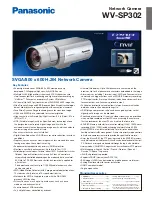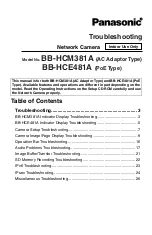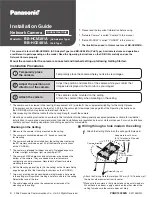
Hi-UD Glass
<
Graph 1
>
0
10
20
30
40
50
60
70
80
90
100
0.02
0.01
0
0.01
0.02
NTSC 400TVL(30lp/mm)
F1.6
HDTV 600TVL(55lp/mm)
Defocus(mm)
MTF(%)
Canon’s New HDgc Series
KH21ex5.7 IRSE
Canon’s Philosophy:
Canon has always developed new technology with four basic philosophies, "High Quality of Picture", "Ease of Operation",
"High Specification" and "Minimize Environmental Impact". Canon's HDTV lenses are, so to speak, a compilation of our
basic philosophies. Now, Canon adds a new concept to the HDTV lenses by launching the new HDgc Series.
Concept of HDgc Series
Corresponding to the popularity of digital High Definition broadcasting and diversity of HDTV
equipment, Canon has added a new series to its HDTV lens line up, the HDgc series. The new HDgc
series supports the emergence of an important new generation of cost-effective HD acquisition systems.
Adopting the advantages created by Canon’s unique technology, the new HDgc lenses exhibit high
MTF, high resolution and high contrast from the center of the image to its extreme edges, meanwhile
maintaining its compact size and weight.
Another important policy of Canon’s is not to pollute the earth and the HDgc series succeeded in
excluding harmful substances such as cadmium, PBBS, PBDPE or mercury from the mechanical parts,
and at the same time incorporating lead free glass and reducing the amount of hazardous substances
used in electrical parts.
Meet Canon’s new HDgc series lenses, a compilation of Canon’s advanced technologies.
Optical Performance of HDgc Series
Aberration Correction for HDgc Lenses
In the HDTV system the pixel size is about half. Therefore, the spread of a point image caused by a
spherical aberration, coma etc. should be diminished to about half. The MTF varies as the focus
changes and even if the image is slightly out of focus, the MTF is greatly influenced as shown in
Graph 1. HDgc greatly contributes to correcting and minimizing these aberrations at the same time
maintaining high MTF throughout the edge of the picture.
Special Optical Elements
With the goal of minimizing chromatic aberration, the HDgc series lenses utilizes special elements
including an artificially re-crystalized element, “Fluorite”, with extraordinary dispersion characteristics
and the newly developed “Hi-UD” (high index ultra low dispersion) glass. Canon has succeeded in the
practical use of special elements along with advanced design techniques like “separate achromatism”.
The KH21ex5.7 and the KH10ex3.6 carries Canon’s original Enhanced Digital Drive, a drive unit equipped with an information display and a
digital function selector so that the user can customize the enhanced digital functions much more easily and precisely. The new design
enables the user to fully bring out the digital functions.
Main Features
Shuttle Shot :
By memorizing any two
focal lengths, the digital drive can
automatically "shuttle" between the two
points, moving in either direction.
Framing Preset :
An angle of view
can be preset in either of two memories
and the lens will zoom to that position
by pushing a simple button. During a
performance, framing preset will reproduce the zoom
position decided upon at the rehearsal. It is easy to repeat
the same zoom as often as you like at the highest speed or
in a preset zoom speed.
Speed Preset :
A specific zoom speed
can be preset in memory and it is
possible to repeat the zoom speed as
often as you like by pushing a simple button.
(Display Image)
Enhanced Digital Drive
KH21ex5.7 IRSE (Unit:mm)
DIMENSIONS
VTR SWITCH
40.6
119.7
F.B. ADJUSTING LOCK SCREW
AUX1 SWITCH
39.5
INDEX MARK
62.1
169.4
111.9
INFORMATION DISPLAY On/Off SWITCH
DIGITAL FUNCTION SELECTOR
INFORMATION DISPLAY
52.9
45
°
C
120
15
30
1.3
8
5.6
11
1.7
16
50
∞
ft m
1.0
20
5.7
(in air)
HOOD
EXTENDER LEVER
IMAGE PLANE
ZOOM LEVER
ZOOM OPERATION
CHANGE-OVER KNOB
ZOOM SPEED VOLUME
MACRO BUTTON
60
4
2.5
6
4.5
7
12
10
φ
98
CONNECTOR FOR
REMOTE ZOOM CONTROL (8 PIN)
CONNECTOR FOR ZOOM REMOTE
& FOCUS REMOTE UNIT (20 PIN)
CONNECTOR FOR ZOOM REMOTE
& FOCUS REMOTE UNIT (20 PIN)
45.3
217.5
38
±
0.03
SPECIFICATIONS
1.0X
2.0X
21X
5.7 – 120mm
11.4 – 240mm
92.2 x 51.9cm
at 5.7mm
4.3 x 2.4cm
at 120mm
46.1 x 26.0cm at 11.4mm
2.2 x 1.2cm
at 240mm
62.9
°
x 38.0
°
3.3
°
x 1.9
°
34.0
°
x 19.5
°
1.7
°
x 0.9
°
0.8m (10mm with Macro)
W x H x L = 169.4 x 111.9 x 217.5 mm
1.79kg
16:9
KH21ex5.7 IRSE
Built-in extender
Zoom Ratio
Range of Focal Length
Maximum Relative Aperture
Angular Field of View
Minimum object Distance (M.O.D.)
Object Dimensions at M.O.D.
Approx. Size
Approx. Mass
1:1.4
at 5.7 – 86mm
1:1.95
at 120mm
1:2.8 at 11.4 – 172mm
1:3.9
at 240mm
Dynamic Zoom Speed Range
●
Zoom Speed from 0.5sec. to over
5min. (From wide end to tele end)
New HDgc Logo
Zoom Ratio 21x
Built-in 2x Extender
Short M.O.D. 0.8m
(10mm with Macro)
• Reduced Chromatic Aberrations
• High and Flat MTF
• Countermeasures Against Ghosting and Flares
Informational
Display
Display Switch
VTR switch
Retum Switch
[Aux1] switch for
enhanced operation
Momentary Iris Switch
Memory
Switch
[Aux2] switch for
enhanced operation
Digital Function
Selector
Enhanced Digital Drive Unit
HDTV Optical Performance
Rotary Encoder
The KH21ex5.7 is equipped with an enhanced
digital drive unit. Conventional potentiometers
are analog positional sensors capable of only 8-
10 bit equivalent resolution. Thus virtual ENG
studio systems called for an optional Encoder
Unit to be put on the zoom and focus ring of the
lens. With the introduction of 16 bit resolution
Rotary Encoder Devices built into the new
enhanced digital drive unit, the lens can simply
be integrated into a virtual digital studio system
without any additions. The encoders also enable
superior precise control. The zoom servo
provides a dynamic range of 0.5 sec. to over a 5
min. super slow zoom. Repeatability in focus
and iris control are also much more precise.
Canon’s unique technology has made the
encoder device surprisingly small to be installed
in the existing drive unit without changes in size
or weight.
Ecological Design
The HDgc series has succeeded in reducing the
use of harmful and hazardous substances that
could pollute the environment.
Lens with Optional
Encoder Unit
Lens with Encoder Devices
included in the Drive Unit
Ecological Design






















